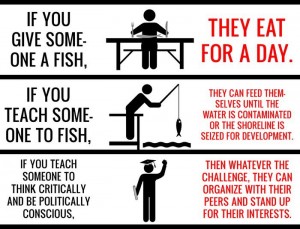I found this interview with author Kevin Carey about "The End of College" to be very much worthwhile. He talks about shifting understandings of the value of higher education, the ways in which college replicates privilege, why college is so expensive, and what college might look like in a few decades.
Carey's main prediction is that a handful of very expensive and elite schools will survive in the traditional model while the rest of higher education shifts to online tools and offline experiences that aren't concentrated in a specific location.
Some sort of major shift seems inevitable. As I watch my own alma mater Earlham College wrestle with increasing costs against the backdrop of a highly competitive admissions landscape, I have to wonder if I would spend the money to send my own children to a place like it.
It's not that I don't believe in the potentially transformative experience of a four-year, residential college experience - my own was a huge influence on who I am and what I do now, and I donate regularly to Earlham so that others can have a similar experience.
But at some point the economics may not make sense any more, especially if between online learning, community learning and immersive travel experiences, a person could have an even broader and more transformative educational experience beyond high school. $50,000+/year can buy a lot of educational experiences.
 It's tempting to blame some of this shifting on a population and culture that doesn't value critical thinking or political consciousness like it once did. While I think that trend is probably real, I'm not sure it's useful to start any sentence with "if we could just get the general population to value X more..." You can reframe the way you talk about the value of college (or strip away the important but perhaps costly things that make a particular college distinctive) only so much before you have to come to terms with a broader reality.
It's tempting to blame some of this shifting on a population and culture that doesn't value critical thinking or political consciousness like it once did. While I think that trend is probably real, I'm not sure it's useful to start any sentence with "if we could just get the general population to value X more..." You can reframe the way you talk about the value of college (or strip away the important but perhaps costly things that make a particular college distinctive) only so much before you have to come to terms with a broader reality.
I don't think this has to be a tale of grief and despair. We've invented and re-invented educational systems many times, and we can do it again. If we do it well - proactively incorporating the implications of the Internet, income inequality and wealth disparity, an increasingly global society that still has many beautifully localized things to offer, and new understandings of how humans learn and find their place in the world - then hopefully we'll look back and see this era of wrestling and consternation about "the end of college" as well worth it.
 I’m a journalist, publisher, software developer and entrepreneur with experience as a founder and organizational leader. Work with me or learn more about me.
I’m a journalist, publisher, software developer and entrepreneur with experience as a founder and organizational leader. Work with me or learn more about me.